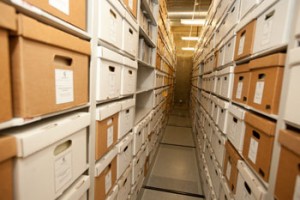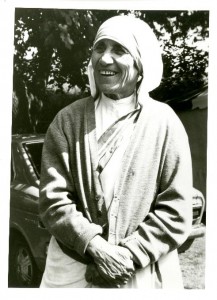
Tucked away on the northern reaches of campus, one may expect the Archives to receive little in the way of visitors. One may imagine us as a group lost amongst stacks of record boxes, shunning outside contact. However, our little space is frequently called upon by University staff, students, and faculty, as well as scholars from across the country and world. Researchers as varied as middle school students to Yale professors to PBS documentarians grace us with visits and inquiries. But what do they ask of us and how do we handle reference questions?
Whether via phone, email, or letter, the CUA Archives receives a variety of reference questions from a spectrum of inquirers. As one can imagine, calls and email requests pour in from University offices, students, and alumni regarding the history of CUA or the broader Brookland neighborhood. But more than anything, as indicated in an earlier post, our collections dealing with the history of American Catholicism as well as labor history are a major draw for scholars outside the campus community. These two source bases provide a wealth of research material for scholars of American religious and labor history, not to mention those curious about genealogy or Catholicism in general.
As the archival technician, I am usually the first person to handle all visiting researchers and incoming inquiries. If you call, you are likely to hear my voice on the other end of the phone. In the course of a single day, I may field questions related to Golden Age Hollywood, the history of CUA football, the Knights of Labor, the Mr. CUA pageant, Archbishop Fulton Sheen, and many other topics. I also regularly receive general inquiries relating to Catholic history, questions regarding DC-area genealogy, and calls from those fascinated (or confused) by our digital materials. A request may involve simply confirming or denying a piece of information or it could involve searching through several reference guides or boxes of material to uncover a needed document.

But while I may be the front line when it comes to questions, the whole archival staff brings its expertise to bear in addressing reference requests. Our daily work with the collections – whether through researching incoming questions or processing materials – makes each of us a resident expert in a variety of topics. Having processed the Mother Teresa collection, for example, I have become familiar with what documents we hold related to the late sister and have been able to field a variety of questions pertaining to her work and that of the Missionaries of Charity.
With that said, we do not have all the answers! There are questions we receive that exceed our collections and staff knowledge. Some of these requests are unexpected and some are frequent inquiries. For example, we often receive requests for genealogical information, relating to parish records or the Ancient Order of Hibernians. In such cases, we either do not hold said records or our holdings are too narrow to offer any information. While I always double-check, just in case, there is rarely a satisfactory answer I can provide.
Additionally, we receive regular phone calls seeking assistance from organizations whose historic or administrative records we hold, such as the St. Vincent de Paul Society. As is often the case for this charitable organization, we unfortunately cannot offer much assistance. Though in this situation, and the genealogical ones above, I offer alternate contacts for inquirers. Whether a local diocesan archive for genealogical searches or the phone numbers for local charities, I want all requesters to walk away a little closer to the answer or assistance they are seeking.
The process for arranging a visit to our site or asking for information is as simple as dialing our phone number (202-319-5065) or sending us an email (lib-archives@cua.edu). While we do not offer art or document appraisals or translation services, reference questions are always welcome. Speaking for myself, it is always a fun challenge to probe our collections and staff knowledge in the quest for an elusive answer or document.
